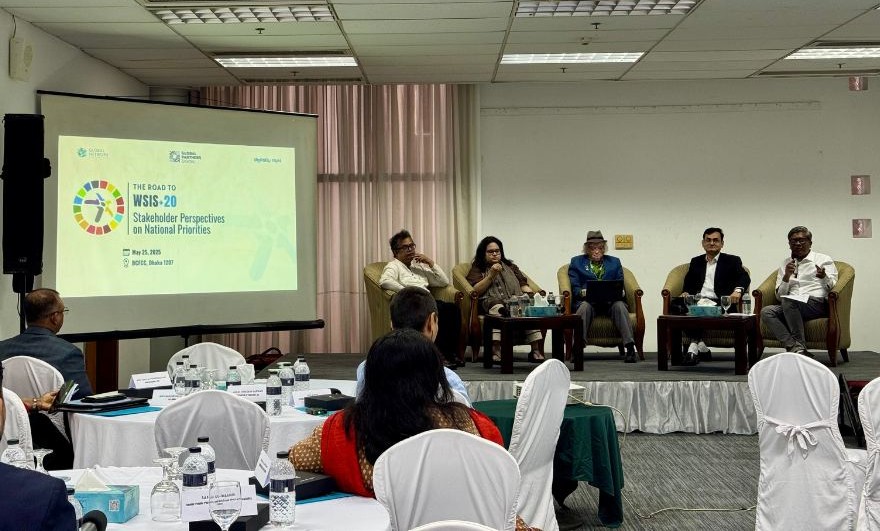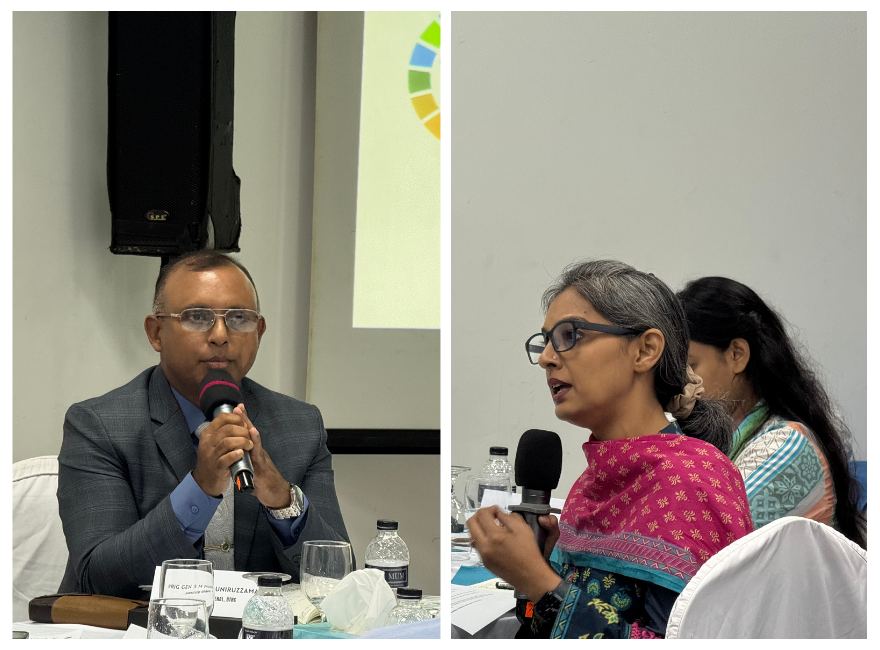The national workshop titled “The Road to WSIS+20: Stakeholder Perspectives on National Priorities” was held on May 25, 2025, bringing together government officials, civil society representatives, private-sector actors, and academics. The discussion took place during a time of political change in Bangladesh, with a new administration expressing interest in more inclusive and rights-based approaches to digital governance. Participants reflected on Bangladesh’s evolving role in global digital policy and contributed inputs on how national priorities could be better aligned with the WSIS+20 process.
The conversation began with a review of Bangladesh’s earlier engagement in WSIS-related initiatives. It was acknowledged that the country had previously participated in regional and national consultations on WSIS Action Lines and had received international recognition for various digital projects. However, many participants pointed out that, over time, engagement had become more state-led, with less opportunity for civil society and independent actors to shape digital policy. While digital infrastructure and e-governance systems had expanded significantly, there was concern that some initiatives prioritized showcasing achievements over ensuring inclusive governance or addressing on-the-ground access issues.

A recurring concern among participants was that many digital initiatives had not been accompanied by meaningful consultations, especially with underrepresented groups such as youth, women, rural communities, or grassroots organizations. Stakeholders noted that while official consultations had taken place in some cases, they were often rushed, closed, or limited to a narrow group of actors. This raised questions about the inclusiveness and transparency of national digital policymaking processes. Several attendees highlighted the need for more consistent and participatory structures that allow wider representation in shaping national digital policy and Bangladesh’s international digital commitments.
On the topic of infrastructure and access, participants emphasized that physical access to digital services remains uneven across regions. They stressed the importance of moving beyond central service delivery models toward more locally responsive solutions that consider affordability, accessibility, and sustainability. In particular, participants discussed the need for public accountability in the use of digital infrastructure funds, including the Social Obligation Fund (SOF), and recommended better transparency in planning, budgeting, and implementation of connectivity projects. There was also a shared interest in seeing more attention given to data stewardship, inclusion, and ethics as integral to digital transformation—not just connectivity targets.
Legal and regulatory concerns also featured prominently in the discussion. Participants expressed concern over the state of digital rights in Bangladesh, particularly in relation to laws such as the Digital Security Act and the Cyber Security Act. There was agreement that these laws have raised significant issues around surveillance, censorship, and restrictions on freedom of expression. While acknowledging the importance of digital safety and regulation, stakeholders emphasized that legal reforms must be carried out in an open and inclusive manner. Some suggested that Bangladesh’s WSIS+20 input should reflect a commitment to aligning national digital laws with international human rights standards, including through independent oversight and transparency in enforcement.

On internet governance, participants noted that key decisions are typically made by a small number of government institutions, with limited broader input. While platforms like the Bangladesh Internet Governance Forum (BIGF) exist, participants pointed out that these have not always translated into long-term, inclusive policy development. The workshop did not produce a formal consensus on institutional reform, but some attendees shared the view that creating regular, open consultation mechanisms—rather than relying on ad-hoc events—could improve stakeholder trust and representation. There was also interest in improving coordination between different institutions working on digital governance, especially given the number of overlapping initiatives and forums currently active in the country.
The workshop also addressed the question of how Bangladesh could link its WSIS+20 engagement with other international digital processes, especially the Global Digital Compact. Several participants highlighted the importance of ensuring coherence between national inputs to both forums and avoiding duplication of efforts. There was a view that the WSIS+20 process remains particularly important for countries like Bangladesh because of its focus on ICT for development. While the relationship between WSIS and the GDC was not resolved in the discussion, participants stressed the need for national clarity on leadership roles, institutional coordination, and how different stakeholders can meaningfully contribute.
In relation to Bangladesh’s Smart Bangladesh agenda, participants acknowledged the potential to align national strategies with WSIS Action Lines. They suggested that Smart Bangladesh initiatives—such as digital public service platforms, e-health, and education reforms—could be better connected to WSIS goals through clearer references to transparency, human rights, and public participation. It was noted that this would require deliberate efforts to integrate WSIS principles into project planning and evaluation, and to ensure that digital innovation is linked to equitable development outcomes.
Several recommendations emerged from the discussions. Participants emphasized the importance of designating a clear institutional lead for WSIS+20 coordination and for communicating its role publicly. They also encouraged the continuation of open consultation processes involving a wider range of civil society actors, youth groups, academia, and the private sector. To improve digital governance, participants proposed more structured mechanisms for ongoing engagement, including regular multistakeholder dialogues and better documentation of how public input is reflected in policy outcomes. On the legal front, there was agreement on the need for legal review processes that are open, participatory, and guided by rights-based frameworks.
There was also strong interest in building partnerships between academic institutions and policymakers to generate local research on issues such as access gaps, digital literacy, and the impact of emerging technologies. Participants suggested that such research could help ground national digital strategies in evidence and inform Bangladesh’s contributions to international policy processes. They further noted the importance of providing clear opportunities for stakeholders to submit their views through formal platforms such as the WSIS Stocktaking Portal or national review consultations.
In terms of follow-up, participants recommended convening additional consultations ahead of the final WSIS+20 review to ensure that national inputs reflect diverse perspectives. They also expressed the need for a more coherent approach to stakeholder engagement across different national forums related to digital policy. While no single next step was agreed upon during the workshop, the shared view was that inclusive governance and transparency must be the foundation for Bangladesh’s continued engagement in the WSIS+20 process and in shaping its national digital future.
In conclusion, the workshop reflected a broad desire among participants to move toward more inclusive, transparent, and rights-respecting digital governance in Bangladesh. The political context of transition was seen as an opportunity to take stock of past experiences and chart a more participatory path forward. While challenges remain, the recommendations and insights shared during the discussions offer a strong starting point for strengthening national engagement in WSIS+20 and aligning global commitments with local realities.
The Road to WSIS+20: Key Country Perspectives in the Twenty-Year Review of the World Summit on the Information Society, a report produced as part of the Shaping the WSIS+20 Review for a Unified Internet Multistakeholderism project coordinated by the Global Network Initiative and Global Partners Digital with support from the inaugural ICANN Grant Program, supports engagement in the WSIS+20 process by providing insight into the positions and priorities of selected governments.
As a project partner, Digitally Right contributed the Bangladesh chapter, highlighting national perspectives, key actors, underlying motivations, opportunities and priorities in the WSIS+20 review process.
Read more about the full report here.


